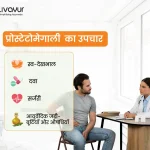This article is reviewed by Dr. Jyoti Lakhani

Trichomoniasis may not be a term that you’ve heard of before because of a general lack of public awareness about sexually transmitted infections or STIs and the importance of safe sex in India. The prevalence rates for trichomoniasis in India are about 10 percent, which is higher than the global prevalence rate of about 8 percent 1. The main risk factor for trichomoniasis is engaging in unsafe sex without condoms and having multiple sexual partners, but it can also be transmitted without direct sexual contact. If undiagnosed and untreated, trichomoniasis can cause pregnancy complications in women, but the infection affects both men and women.
Trichomoniasis Causes
Trichomoniasis is usually transmitted through sexual activity, including vaginal intercourse, anal intercourse, or oral-genital contact. It can be passed between partners even if symptoms are not present. In rare cases, it can also be transmitted through sharing contaminated objects like sex toys, although this is less common 2.
Trichomoniasis is caused by direct contact with the parasite, typically during sexual contact with an infected partner. The parasite resides in the vagina or urethra in women and the urethra in men. It can survive outside the body for brief periods, which is why transmission can occur even without direct sexual contact.
It’s important to note that trichomoniasis is not caused by bacteria or viruses like some other STIs such as gonorrhea or genital herpes. Instead, it is caused by a single-celled organism, the Trichomonas vaginalis parasite 3.
Trichomoniasis Symptoms
The symptoms of trichomoniasis can vary between individuals, and some infected individuals may not experience any symptoms at all. However, when symptoms do occur, they typically appear within 5 to 28 days after exposure. Here are the main trichomoniasis symptoms 4:
Trichomoniasis Symptoms In Women:
- Vaginal discharge that may be frothy, yellow-green, or gray in color, and may have a strong odor.
- Vaginal itching or irritation.
- Pain or discomfort during sexual intercourse.
- Painful urination or frequent urge to urinate.
- Swelling or redness of the genital area.
Trichomoniasis Symptoms In Men:
- Discharge from the penis: It may be thin, white, or watery.
- Itching or irritation inside the penis.
- Burning sensation after urination or ejaculation.
- Frequent urination.
Keep in mind that trichomoniasis often causes no symptoms but can increase the risk of other sexually transmitted infections and complications, such as pelvic inflammatory disease (PID) in women.
Trichomoniasis Diagnosis
If you have reason to believe that you may have been exposed to infection or are infected because of trichomoniasis discharge or other symptoms, make sure to talk to your doctor or a qualified gynecologist or urologist. An accurate diagnosis is essential for proper treatment, which can cure the disease. The main diagnostic tests include 5:
- Microscopy
- Rapid Antigen Tests
- Nucleic Acid Amplification Tests
These tests usually require a sample of vaginal fluid or urine. Your doctor may also advise other tests as trichomoniasis often occurs along with other STIs.
Trichomoniasis Treatment
The primary treatment for trichomoniasis involves the use of prescription medications. Here is an overview of the treatment options available 6:
Metronidazole
This is the most commonly prescribed medication for trichomoniasis. It is an oral antibiotic that works by killing the Trichomonas vaginalis parasite. Metronidazole is usually taken as a single dose or in a 7-day course. It’s important to avoid alcohol consumption while taking metronidazole, as it can cause severe nausea and vomiting.
Tinidazole
Tinidazole is an alternative medication to metronidazole. It is also an oral antibiotic that effectively treats trichomoniasis. Like metronidazole, it is typically taken as a single dose or in a 2-gram dose for a 2-day course.
Partner Treatment
It is important for both sexual partners to receive treatment simultaneously to prevent reinfection 7. Even if the partner does not show symptoms, they should still be treated to eliminate the infection.
Follow-Up Testing
After completing the prescribed course of medication, it is advisable to undergo follow-up testing to ensure the infection has been successfully cleared. This is especially important for pregnant women, as trichomoniasis can increase the risk of preterm delivery.
Retreatment
In some cases, the initial treatment may not fully eliminate the infection, or reinfection may occur. If symptoms persist or recur after treatment, a healthcare professional may recommend a repeat course of metronidazole or tinidazole.
Alternative Trichomoniasis Treatment In Ayurveda
Although conventional treatments involving systemic and local antibiotics are effective, they can cause some side effects and more importantly will not help prevent recurrences. Fortunately, Ayurvedic medicine can help in both treatment and prevention of trichomoniasis. In fact, the condition is described in Ayurvedic texts as Shleshmala Yonivyapada, along with natural treatment options 8. There are various evidence-based approaches to the treatment of trichomoniasis in Ayurveda. These include:
- Management with the use of Mahanimba, which contains formulations for Sthanik Chikitsa, are shown to be quite effective because of the presence of Krimighna and Kandughna properties 9.
- Nimba-Jambu-Vasa kwath is regarded as one of the most effective Ayurvedic formulations for the treatment of trichomoniasis, especially in the early stages of the disease where symptoms remain localized. A controlled trial found it to be effective without posing risks of toxicity or side effects 10.
- As has been noted before, trichomoniasis during pregnancy can be problematic, but this can be dealt with using the Ayurvedic formulation of Dhatakyadi Varti. It is not only effective, but a controlled randomized clinical trial also showed it to be a safe treatment during pregnancy 11.
Conclusion
Trichomoniasis is a often neglected sexually transmitted disease, but it is still a serious condition that demands attention. A speedy diagnosis and proper treatment are important to prevent complications, but Ayurveda has a significant role to play because of side effects associated with conventional treatments. However, due to the complexities involved, it is important to speak to an Ayurvedic doctor for personalized treatment advice.
FAQs
Is trichomoniasis a serious infection?
Yes, it may not cause severe symptoms and can even occur without symptoms, but it increases the risk of other STIs and complications.
Can trichomoniasis be cured?
Trichomoniasis can be cured completely as current treatments are extremely effective.
Will trichomoniasis go away on its own?
Trichomoniasis does not resolve naturally and if left untreated can remain problematic for months or years.
Can trichomoniasis cause infertility?
When left untreated, trichomoniasis can cause pelvic inflammatory disease in some women and this can in turn cause infertility.
Disclaimer: The information provided here is for general information and not meant to substitute any medical advice. Please consult your doctor for appropriate medical consultation.
References:
- https://www.ncbi.nlm.nih.gov/pmc/articles/PMC5015492/
- https://www.ncbi.nlm.nih.gov/pmc/articles/PMC4553853/
- https://www.cdc.gov/std/trichomonas/stdfact-trichomoniasis.htm
- https://www.ncbi.nlm.nih.gov/books/NBK534826/
- https://www.ncbi.nlm.nih.gov/pmc/articles/PMC2095007/
- https://www.ncbi.nlm.nih.gov/pmc/articles/PMC1744792/
- https://www.cdc.gov/std/treatment-guidelines/trichomoniasis.htm
- http://www.iamj.in/posts/images/upload/1076_1082.pdf
- https://ijapr.in/index.php/ijapr/article/view/2765
- https://ijam.co.in/index.php/ijam/article/view/3039
- https://www.ncbi.nlm.nih.gov/pmc/articles/PMC5688842/





















